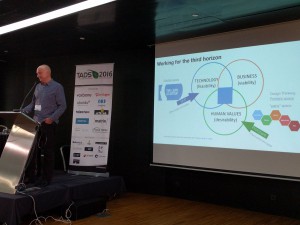 We’ve added an evening workshop to TADSummit 2017 agenda on Design Thinking & Effectuation on the first day Tuesday 14th November. It will be given by Philippe Vayssac, CIO, Groupama. Philippe has achieved an impressive track record of successful innovations at Groupama. He has studied for over 5 years the methods of Design Thinking and Effectuation; and considers them core to his success. This special evening session is for those who want to understand an introduction to these methods to help achieve successful innovations whether you work in large corporation or start-ups and smaller companies.
We’ve added an evening workshop to TADSummit 2017 agenda on Design Thinking & Effectuation on the first day Tuesday 14th November. It will be given by Philippe Vayssac, CIO, Groupama. Philippe has achieved an impressive track record of successful innovations at Groupama. He has studied for over 5 years the methods of Design Thinking and Effectuation; and considers them core to his success. This special evening session is for those who want to understand an introduction to these methods to help achieve successful innovations whether you work in large corporation or start-ups and smaller companies.
We also plan to use these methods with Philippe’s help at TADHack Global 2018. To help teams develop their hacks during the event, as well as encouraging them to continue developing their ideas into world-changing businesses afterwards.
Effectuation is a way of thinking that serves entrepreneurs in the processes of opportunity identification and new venture creation. There are five core principles that define Effectual Logic.
- The Bird in Hand Principle. Entrepreneurs start with what they have. They will look at who they are, what they know and who they know. Their education, tastes and experience are examples of factors which are important in this stage. Besides these examples, this is also the stage where entrepreneurs look at their 3Fs, better known as friends, family and fools. From this point, they will look at their abilities. So an entrepreneur does not start with a given goal, but with the tools he or she has.
- The Affordable Loss Principle. An entrepreneur does not focus on possible profits, but on the possible losses and how they can minimize those losses.
- The Crazy Quilt Principle. Entrepreneurs cooperate with parties they can trust. These parties can limit the affordable loss by giving pre-commitment.
- The Lemonade Principle. Entrepreneurs will look at how to leverage contingencies. Surprises are not necessarily seen as something bad, but as opportunities to find new markets.
- The Pilot-in-the-plane. In this stage, all the previous principles are put together. The future cannot be predicted, but entrepreneurs can control some of the factors which determine the future.
In my experience principles are useful tools in understanding a method. However, the hardest part is the practical application of a method. This is why Philippe’s workshop is so important as he brings years of experience in the real-world implementation of Effectuation.
Design Thinking uses the designer’s sensibility and methods to match people’s needs with what is technologically feasible and what a viable business strategy can convert into customer value and market opportunity. Design thinking is a method for practical, creative resolution of problems. It is a form of solution-based thinking with the intent of producing a constructive future result.
Compared to the scientific method, which begins by stating a hypothesis and then, via a feedback mechanism, continues iteratively to form a model or theory, design thinking differs from that by including consideration of the emotional content of the situation. The human aspect that Philippe will focus upon in his presentation earlier on the 14th Nov.
While feedback in the scientific method is mostly obtained by collecting observational evidence with respect to observable/measurable facts, design thinking feedback also considers the consumer’s emotional state regarding the problem, as well as their stated and latent needs, in discovering and developing solutions. There is growing interest in the application of Design Thinking in software engineering and healthcare innovation.
In scientific methods with a heavy emphasis on math or physics, emotional elements are typically ignored. Design thinking identifies and investigates both known and ambiguous aspects of the current situation in an effort to discover parameters and alternative solution sets which may lead to one or more satisfactory goals. Because design thinking is iterative, intermediate “solutions” are potential starting points of alternative paths, allowing for redefinition of the initial problem, in a process of co-evolution of problem and solution.
TADSummit brings the best and brightest minds together, with a focus on Programmable Telecoms. While every presentation through the event shows programmable telecoms is only a part (albeit powerful part) of success. Hence we also focus on methods and technologies we consider important to our future success, Design Thinking and Effectuation being one of them, with this special evening workshop.
